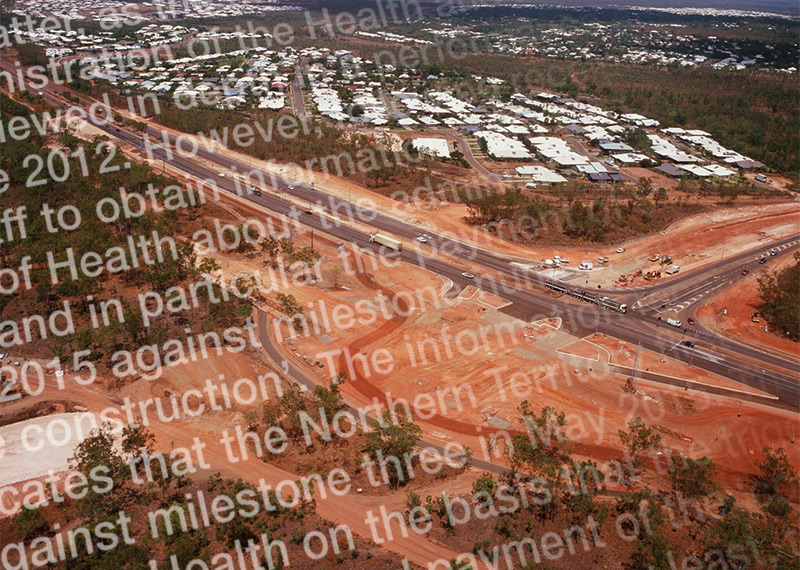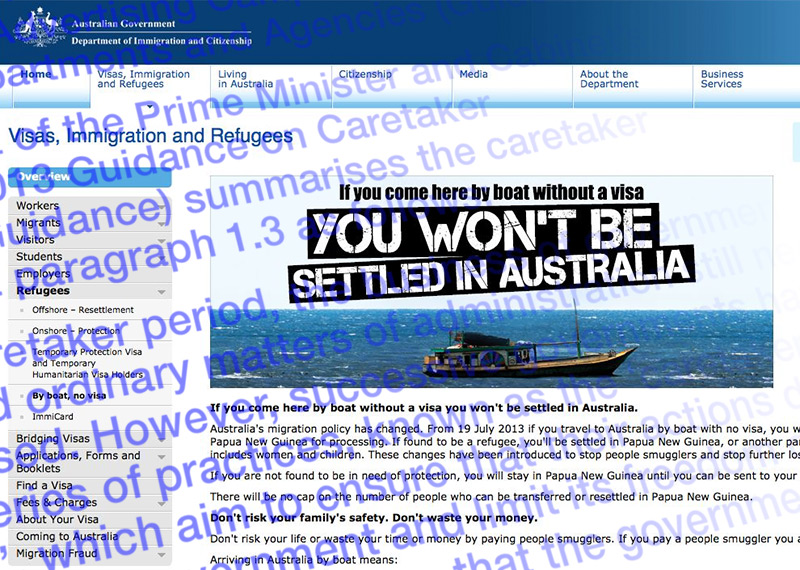Browse our range of reports and publications including performance and financial statement audit reports, assurance review reports, information reports and annual reports.
The Auditor-General responded on 18 March 2019 to correspondence from the Hon. Shayne Neumann MP dated 19 February 2019 and 14 March 2019. The Auditor-General further responded on 1 April 2019. The correspondence from Mr Neumann requested that the Auditor-General conduct an audit into the circumstances surrounding the Department of Home Affairs' procurement of garrison support and welfare services in Papua New Guinea.
Please direct enquiries relating to requests for audit through our contact page.
The Auditor-General responded on 29 March 2019 to the follow-up correspondence from the Hon. Mark Dreyfus QC MP dated 26 March 2019. Mr Dreyfus requested that the Auditor-General extend his investigation to look at the conduct of a range of parties in relation to the announcement of grants. This is in addition to the request to investigate the conduct of a range of parties in relation to the announcement of the grant to the Yankalilla Bowling Club, which was the subject of the original correspondence dated 24 February 2019.
Please direct enquiries relating to requests through our contact page.
The Auditor-General responded on 29 March 2019 to correspondence from Ms Cathy McGowan AO MP dated 5 March 2019, requesting that the Auditor-General investigate the conduct of a range of parties in relation to the announcement of grants under Round 3, Building Better Regions Fund.
Please direct enquiries relating to requests through our contact page.
The Auditor-General responded on 20 April 2018 to correspondence from Mr Stephen Jones MP dated 26 March 2018, requesting that the Auditor-General conduct an investigation to examine the awarding of a grant under the Regional Jobs and Investment Package program in Tropical North Queensland. The Acting Auditor-General followed-up on 23 January 2019 to advise Mr Jones that an audit of the Regional Jobs and Investment Packages has now commenced.
Please direct enquiries relating to requests for audit through our contact page.
The Auditor-General responded on 20 April 2018 to correspondence from the Hon. Dr Mike Kelly MP dated 6 April 2018, requesting an audit of the administration of the Regional Jobs and Investment Packages (RJIP) program, specifically as it relates to the allocation of grant funding between electorates. The Acting Auditor-General followed-up on 23 January 2019 to advise Dr Kelly that an audit of the Regional Jobs and Investment Packages has now commenced.
Please direct enquiries through our contact page.
The Auditor-General responded on 27 November 2018 to correspondence from Senator Hanson-Young dated 26 October 2018, requesting that the Auditor-General conduct an investigation to examine the use of grant funding from the Connections Project.
Please direct enquiries relating to requests for audit through our contact page.
The Auditor-General has responded to a request from Mr Pat Conroy MP dated 28 September 2018, asking that the Auditor-General conduct an audit of aspects of the Government advertising campaign: Powering Forward.
Please direct enquiries through our contact page.
The Auditor-General responded on 24 August 2018 to a request from Mr Ross Vasta MP dated 30 July 2018, asking that the Auditor-General consider correspondence from the Sporting Shooters Association of Australia (Brisbane) dated 12 July 2018. The association is requesting an audit of the Australian Communications and Media Authority (ACMA) Spectrum Management & Analysis Section project that installed radio monitoring infrastructure on Mount Petrie.
Please direct enquiries relating to requests for audits through our contact page.
The Auditor-General responded on 21 August 2018 to correspondence from Dr Jim Chalmers MP and Ms Michelle Rowland MP dated 26 July 2018, requesting that the Auditor-General conduct an assurance review of the financial assumptions underpinning the long-term economics of the NBN.
Please direct enquiries through our contact page.
The Auditor-General responded on 20 July 2018 to correspondence from the Hon. Catherine King MP dated 31 May 2018, requesting that the Auditor-General conduct an investigation to examine the circumstances surrounding the listing of afatinib (Giotrif®) on the Pharmaceutical Benefits Scheme (PBS).
Please direct enquiries relating to requests for audit through our contact page.
The Auditor-General responded on 19 April 2017, and followed-up on 19 July 2017 and 18 May 2018, to correspondence from the Hon. Wayne Swan MP dated 27 March 2017, requesting that the Auditor-General conduct an investigation to examine the operation of the Northern Australia Infrastructure Facility (NAIF), its independence and the quality of the systems and analyses being implemented.
Please direct enquiries relating to requests for audit through our contact page.
The Auditor-General responded on 18 May 2018 to correspondence from Senator Whish-Wilson dated 24 April 2018, requesting that the Auditor-General conduct an audit of the implementation of declaration of interest and conflict of interest policies by the Australian Securities and Investments Commission (ASIC).
Please direct enquiries through our contact page.
The Auditor-General responded on 23 November 2017 to correspondence from Senators Abetz, Paterson and Reynolds dated 27 October 2017, requesting that the Auditor-General undertake an examination of the administration and governance arrangements relating to the Student Services and Amenities Fee (SSAF). Following a request from Senator Abetz on 17 January 2018 for a more detailed response, the Auditor-General followed-up on 5 April 2018.
Please direct enquiries relating to requests for audit through our contact page.
The Auditor-General responded to, and then followed-up, correspondence from the Hon. Tony Burke MP dated 25 July 2017, requesting that the Auditor-General conduct an investigation into allegations arising out of a recent Four Corners program concerning the Murray-Darling Basin.
Please direct enquiries relating to requests for audit through our contact page.
The Auditor-General responded on 19 September 2017 to correspondence from Mr Stephen Jones MP dated 6 September 2017, requesting that the Auditor-General undertake an independent assessment of the project funding provided to Central Coast Group Training Ltd (CCGT) for the Central Coast Youth Skills and Employment Centres, and the administration of the Community Development Grants Program.
Please direct enquiries relating to requests for audit through our contact page.
The Auditor-General responded on 14 December 2016, and followed-up on 19 July 2017, to correspondence from Senator Kakoschke-Moore on 14 November 2016 requesting that the Auditor-General conduct an audit of the National Affordable Housing Agreement (NAHA).
Please direct enquiries relating to requests for audit through our contact page.
The Acting Auditor-General responded on 11 May 2017, and the Auditor-General followed-up on 19 July 2017, to correspondence from Ms Cathy McGowan AO MP dated 10 April 2017. Ms McGowan had requested that the Auditor-General conduct an audit of the Regional Australia Impact Statement process, which is administered by the Department of Infrastructure and Regional Development.
Please direct enquiries relating to requests for audit through our contact page.
The Acting Auditor-General responded on 31 May 2017, and the Auditor-General followed-up on 19 July 2017, to correspondence from Mr Stephen Jones MP dated 15 May 2017. Mr Jones MP had requested that the Auditor-General conduct an audit of the Community Development Grants Programme, administered by the Department of Infrastructure and Regional Development, to provide an independent assessment of its administration.
Please direct enquiries relating to requests for audit through our contact page.
The Auditor-General responded on 27 June 2017 to correspondence from Mr Andrew Wilkie MP dated 26 May 2017, requesting that the Auditor-General conduct an audit of Centrelink's automated debt recovery programs.
Please direct enquiries relating to requests for audit through our contact page.
The Auditor-General responded on 22 June 2017 to correspondence from Senator Sarah Hanson-Young dated 31 May 2017, requesting that the Auditor-General conduct an audit of the current and historical funding practices of the Catholic Education Commissions.
Please direct enquiries relating to requests for audit through our contact page.
The Auditor-General responded on 27 February 2017 to correspondence from Dr Jim Chalmers MP dated 29 December 2016, requesting that the Auditor-General conduct an audit of aspects of the lease arrangements for the rifle range at Malabar Headland in New South Wales (NSW).
Please direct enquiries relating to requests for audit through our contact page.
The Auditor-General responded on 17 January 2017 to correspondence from the Hon. Linda Burney MP on 5 January 2017 requesting that the Auditor-General conduct an audit of the Centrelink debt recovery and welfare integrity programs.
Please direct enquiries relating to requests for audit through our contact page.
The Deputy Auditor-General responded on 5 January 2017 to correspondence from the Hon. Mark Dreyfus QC MP on 4 November 2016 requesting the Auditor-General investigate if grants awarded under the Apprenticeship Training Alternative Delivery Pilots program represented value for money for the Australian taxpayer.
Please direct enquiries relating to requests for audit through our contact page.
The Auditor-General responded on 2 December 2016 to correspondence from Senator the Hon Stephen Parry, President of the Senate, on 14 October 2016, regarding a resolution agreed by the Senate requesting that the Auditor-General conduct a performance audit assessing the procurement of services related to the National Cancer Screening Register.
Please direct enquiries relating to requests for audit through our contact page.
The Auditor-General responded on 10 November 2016 to correspondence from The Hon Joel Fitzgibbon MP on 13 October 2016 requesting the ANAO include the impact of the Australian Government’s proposed relocation of the Australian Pesticides and Veterinary Authority in its current performance audit of Pesticide and Veterinary Medicine (agvet) Regulatory Reform.
Please direct enquiries relating to requests for audit through our contact page.
Response completed as a limited scope assurance review.
The Auditor-General responded on 9 September 2016 to correspondence from the Hon Brendan O’Connor MP on 15 June 2016 regarding the appropriateness of arrangements concerning the Liberal Party of Australia entity Parakeelia Pty Ltd.
Please direct enquiries relating to requests for audit through our contact page.
The Auditor-General responded on 22 August 2016 to correspondence from Senator Nick Xenophon on 20 May 2016 requesting a performance audit of the Command and Control System selection for the SEA 1000 Future Submarine Project.
Please direct enquiries relating to requests for audit through our contact page.
The Auditor-General (A/g) responded on 18 May 2016 to correspondence from the Hon Anthony Albanese MP on 16 January 2016 regarding the ANAO performance audit of the approval and administration of Commonwealth funding for the WestConnex Project.
Please direct enquiries relating to requests for audit through our contact page.
The Auditor-General (A/g) wrote on 18 May 2016 to Senator Lee Rhiannon regarding the ANAO performance audit of the approval and administration of Commonwealth funding for the WestConnex Project. This is a follow-up to correspondence with Senator Rhiannon published on 8 September 2015.
Please direct enquiries relating to requests for audit through our contact page.
The Auditor-General responded on 9 May 2016 to correspondence from Ms Catherine King MP on 22 April 2016 regarding comments made by Ms Sophie Mirabella in relation to Commonwealth funding for Wangaratta Hospital.
Please direct enquiries relating to requests for audit through our contact page.
Response completed as a limited scope assurance review.
The Auditor-General responded on 26 April 2016 to correspondence from Mr Pat Conroy MP on 16 February 2016 regarding the government advertising campaign Welcome to the Ideas Boom.
Please direct enquiries relating to requests for audit through our contact page.
The Auditor-General responded on 6 April 2016 to correspondence from Senator Hanson-Young on 30 March 2016 regarding Refugee resettlement deal established between the Commonwealth Government of Australia and the Kingdom of Cambodia in September of 2014.
Please direct enquiries relating to requests for audit through our contact page.
The Auditor-General responded on 8 March 2016 to correspondence from the Hon Dr Sharman Stone MP on 18 February 2016 regarding Goulburn Murray Water Connections Project 2 (GMWCP2).
Please direct enquiries relating to requests for audit through our contact page.
Response completed as a limited scope assurance review.
The Auditor-General responded on 14 January 2016 to correspondence from the Hon Catherine King MP on 22 October 2015, on the project agreement for the Health and Hospitals Fund – 2010 Regional Priority Round Project in Palmerston.
Please direct enquiries relating to requests for audit through our contact page.
The Auditor-General responded on 11 December 2015 to correspondence from Senator the Hon Doug Cameron on 30 October 2015 regarding systems and processes within the Department of Human Services (DHS) that go to the security of citizens' identity.
Please direct enquiries relating to requests for audit through our contact page.
The Auditor-General responded on 9 December 2015 to correspondence from the Hon Shayne Neumann MP on 7 September 2015 regarding Indigenous Advancement Strategy.
Please direct enquiries relating to requests for audit through our contact page.
The Auditor-General responded on 1 December 2015 to correspondence from Senator Nick Xenophon of 29 October and 5 November 2015, on the advertising campaign promoting Free Trade Agreements in Asia.
Please direct enquiries relating to requests for audit through our contact page.
The Auditor-General (A/g) responded on 6 October 2015 to correspondence from the Hon Richard Marles MP on 30 August 2015 regarding training that has been provided to officials within Australian Border Force (ABF) since its inception on 1 July.
Please direct enquiries relating to requests for audit through our contact page.
The Auditor-General (A/g) responded on 24 September 2015 to correspondence from Senator Glenn Lazarus on 10 September 2015 regarding National Stronger Regions Fund.
Please direct enquiries relating to requests for audit through our contact page.
The Auditor-General (A/g) responded on 24 September 2015 to correspondence from the Hon Warren Truss MP on 18 September 2015 regarding probity and conflict of interest arrangements in place for the OneSKY Australia programme being led by Airservices Australia.
Please direct enquiries relating to requests for audit through our contact page.
The Auditor-General (A/g) responded on 23 September 2015 to correspondence from Mr Tim Watts MP on 28 August 2015 regarding Liberal Party misappropriation of parliamentary entitlements.
Please direct enquiries relating to requests for audit through our contact page.
The Auditor-General (A/g) responded on 23 September 2015 to correspondence from Ms Julie Collins MP on 1 September 2015 regarding parliamentary entitlements paid to Liberal MPs and Senators.
Please direct enquiries relating to requests for audit through our contact page.
The Auditor-General (A/g) responded on 23 September 2015 to correspondence from Senator Nick Xenophon on 8 September 2015 regarding florist at Parliament House, DPS and LGW Design.
Please direct enquiries relating to requests for audit through our contact page.
The Auditor-General (A/g) responded on 23 September 2015 to correspondence from Alannah MacTiernan MP on 7 September 2015 regarding the Perth Freight Link Project in Western Australia.
Please direct enquiries relating to requests for audit through our contact page.
The Auditor-General (A/g) responded on 15 September 2015 to correspondence from Ms Michelle Rowland MP on 7 September 2015 regarding administration of the Mobile Black Spot Program.
Please direct enquiries relating to requests for audit through our contact page.
The Auditor-General (A/g) responded on 15 September 2015 to correspondence from the Hon Dr Sharman Stone MP on 11 September 2015 regarding Murray-Darling Basin Authority's (MDBA) implementation of the Basin Plan.
Please direct enquiries relating to requests for audit through our contact page.
The Auditor-General responded on 8 September 2015 to correspondence from Senator Lee Rhiannon on 10 August 2015 regarding the WestConnex road building project in NSW.
Please direct enquiries relating to requests for audit through our contact page.
Response completed as a limited scope assurance review.
The Auditor-General responded on 2 September 2015 to correspondence from Senator Nick Xenophon of 3 June 2015 on the Australian bid for the football World Cup.
Please direct enquiries relating to requests for audit through our contact page.
The Auditor-General responded on 6 August 2015 to correspondence from Senator Lee Rhiannon on 22 July 2015 regarding Bronwyn Bishop's use of entitlements to pay $5,000 for a charter flight.
Please direct enquiries relating to requests for audit through our contact page.
The Auditor-General responded on 20 January 2015 to correspondence from Senator Nick Xenophon of 9 December 2014 and Senator the Hon Kim Carr of 15 January 2015, on the advertising campaign on higher education issues.
Please direct enquiries relating to requests for audit through our contact page.
Response completed as a limited scope assurance review.
The Auditor-General responded on 30 July 2014 to questions raised on 26 May 2014 by Senator the Hon Penny Wong on the appointment of Mr Peter Crone as head of Secretariat for the National Commission of Audit.
Please direct enquiries relating to requests for audit through our contact page.
The Auditor-General responded on 14 August 2013 to correspondence from Senator Nick Xenophon of 12 August 2013 on the continuation of the Australian Government’s By boat, no visa advertising campaign during the caretaker period.
Please direct enquiries relating to requests for audit through our contact page.
The Auditor-General responded on 1 August 2013 to correspondence from Senator Nick Xenophon of 22 July 2013 on the By boat, no visa advertising campaign.
Please direct enquiries relating to requests for audit through our contact page.
The objective of this audit is to examine whether the Department of Parliamentary Services (the department) has an effective baseline of cyber security controls.
Please direct enquiries through our contact page.
The objective of this audit is to assess the effectiveness of the Department of the Treasury’s (Treasury) design and delivery of the Housing Australia Future Fund.
Please direct enquiries through our contact page.
The objective of this audit is to audit the Department of the Treasury’s (Treasury) readiness to implement the Scams Prevention Framework (SPF).
Please direct enquiries through our contact page.
The objective of this audit is to assess the effectiveness of the Department of Veterans’ Affairs’ (DVA’s) management of the compensation claims backlog.
Please direct enquiries through our contact page.
The objective of this audit is to assess whether IP Australia’s use of artificial intelligence (AI) and automated decision-making systems in the patent examination process is effective.
Please direct enquiries through our contact page.
The objective of this audit is to assess the effectiveness of the Department of Climate Change, Energy, the Environment and Water’s design and delivery of the Urban Rivers and Catchments Program in support of the achievement of program outcomes.
Please direct enquiries through our contact page.
The objective of this audit is to assess the effectiveness of Services Australia’s use of its enforcement powers for child support debt.
Please direct enquiries through our contact page.
The objective of this audit is to assess the effectiveness of the consideration and use of automation and artificial intelligence (A&AI) in the management of health benefits integrity.
Please direct enquiries through our contact page.
The objective of this audit is to assess whether evaluation of Australian Government programs aimed at First Nations peoples is fit for the purpose of continuous improvement, accountability and decision-making.
Please direct enquiries through our contact page.
The objective of this audit is to assess the effectiveness of the National Disability Insurance Agency’s (NDIA) design and implementation of the Participants, Platforms and Processes program (program) (including the PACE system).
Please direct enquiries through our contact page.
The objective of this audit is to assess whether market stewardship frameworks for the care and support economy promote the economic, efficient, effective and ethical use of public resources.
Please direct enquiries through our contact page.
The objective of this audit is to assess the effectiveness of the Department of Finance’s (Finance) administration of the Digital ID Program.
Please direct enquiries through our contact page.
The objective of this audit is to assess the effectiveness of Services Australia’s compliance with domestic and international travel requirements.
Please direct enquiries through our contact page.
The objective of this audit is to assess the effectiveness to date of the Department of Defence’s (Defence) procurement of Infantry Fighting Vehicles (LAND 400 Phase 3).
Please direct enquiries through our contact page.
The objective of this audit is to assess the effectiveness of the Department of Social Services’ (DSS) and Services Australia’s management of the age pension.
Please direct enquiries through our contact page.
The objective of this audit is examine whether Department of Defence's (Defence’s) management of the Strategic Domestic Munitions Manufacturing (SDMM) contract has achieved value for money and the effective delivery of the contracted arrangements.
Please direct enquiries through our contact page.
The objective of this audit is to assess the effectiveness of the design and implementation of the Safer Local Roads and Infrastructure Program (SLRIP).
Please direct enquiries through our contact page.
The objective of this audit is to assess the effectiveness of the Australian Taxation Office’s (ATO) management of small business taxpayer debt.
Please direct enquiries through our contact page.
The objective of this audit is to assess whether the selected entities’ administration of Freedom of Information Act 1982 (FOI) requests is effective in giving the community access to Australian Government information.
Please direct enquiries through our contact page.
The objective of this audit is to assess the effectiveness to date of the Department of Defence’s (Defence) planning and implementation of the Collins Class Life of Type Extension.
Please direct enquiries through our contact page.
The objective of this audit is to examine whether the Department of Industry, Science and Resources (DISR) has implemented a selection of Auditor-General recommendations.
Please direct enquiries through our contact page.
The objective of this audit is to assess whether the management of funding under the Settlement Engagement and Transition Support services program was effective in achieving the program objectives and consistent with the Commonwealth Grant Rules and Guidelines.
Please direct enquiries through our contact page.
The objective of this audit is to assess the effectiveness of the Department of Health and Aged Care’s (Health) development and monitoring of suicide prevention measures.
Please direct enquiries through our contact page.
The objective of this audit is to assess the effectiveness of the Department of Climate Change, Energy, the Environment & Water (DCCEEW) and Australian Renewable Energy Authority’s (ARENA) delivery of the Community Batteries for Household Solar program.
Please direct enquiries through our contact page.
The objective of this audit is to assess the effectiveness of the Department of Defence’s (Defence) administration of investigations.
Please direct enquiries through our contact page.
The objective of this audit is to assess the effectiveness of the Department of Education’s administration of the National Collaborative Research Infrastructure Strategy, with a focus on whether an outcomes orientation has been adopted.
Please direct enquiries through our contact page.
The objective of this audit is to assess the effectiveness of Snowy Hydro Limited's (SHL) management of the delivery of Snowy 2.0 in support of achieving value for money.
Please direct enquiries through our contact page.
The objective of this audit is to assess whether Indigenous corporations are being effectively supported and regulated under the Corporations (Aboriginal and Torres Strait Islander) Act 2006 (CATSI Act).
Please direct enquiries through our contact page.
The objective of this audit is to assess the effectiveness of the Commonwealth Home Support Programme.
Please direct enquiries through our contact page.
The objective of this audit is to assess whether the Department of Defence (Defence) has complied with gifts, benefits and hospitality requirements.
Please direct enquiries through our contact page.
The objective of this audit is to assess whether the award of funding under Department of Defence’s (Defence’s) Industry grants programs was consistent with the Commonwealth Grant Rules and Guidelines (CGRGs).
Please direct enquiries through our contact page.
The objective of this audit is to assess the readiness of the Australian Bureau of Statistics’ (ABS) cyber security arrangements for the 2026 Census.
Please direct enquiries through our contact page.
The objective of this audit is to assess whether procurements conducted by the Department of Foreign Affairs and Trade for the Security Enhancement Program achieved value for money and complied with the Commonwealth Procurement Rules.
Please direct enquiries through our contact page.
The objective of this audit is to assess whether the award of funding under Defence’s Industry grants programs was consistent with the Commonwealth Grant Rules and Guidelines (CGRGs).
Please direct enquiries through our contact page.
The objective of this audit is to assess whether Department of Agriculture, Fisheries and Forestry (DAFF) effectively applies the cost recovery principles of the Australian Government’s cost recovery policy.
Please direct enquiries through our contact page.
The objective of this audit is to assess whether the expected benefits from Department of Foreign Affairs and Trade’s (DFAT) Security Enhancements Programs (SEP) have been realised.
Please direct enquiries through our contact page.
The objective of the audit was to assess the effectiveness of partnership arrangements, funding design activities and measurement of progress for schooling and early childhood development commitments under the National Agreement on Closing the Gap.
Please direct enquiries through our contact page.
The objective of the audit was to assess whether Australian Criminal Intelligence Commission has effective arrangements to comply with domestic and international travel legislative and entity requirements.
Please direct enquiries through our contact page.
This audit would assess the effectiveness of the processes to design and co-ordinate programs to address rates of family and gendered violence, and out of home care, under the National Agreement on Closing the Gap.
Target 12 of the National Agreement on Closing the Gap is to reduce the rate of over-representation of Aboriginal and Torres Strait Islander children in out-of-home care by 45 per cent by 2031. Target 13 is to reduce the rate of all forms of family violence and abuse against Aboriginal and Torres Strait Islander women and children by at least 50 per cent by 2031. Both targets seek to achieve the goal of stronger families. The Australian government has agreed to commitments under the National Plan to End Violence against Women and Children 2022–2032 and the Aboriginal and Torres Strait Islander Action Plan 2023–25. The Department of Social Services plays a leading role in supporting the achievement of targets 12 and 13. The National Indigenous Australians Agency is responsible for leading and coordinating the development and implementation of Australia’s Closing the Gap targets in partnership with Indigenous Australians.
The ANAO agreed to consider an audit into target 13 in response to recommendation 8 of the Senate Standing Committee on Legal and Constitutional Affairs’ August 2024 report into Missing and Murdered First Nations Women and Children.
Please direct enquiries through our contact page.
Justice reinvestment is a long-term, community-led approach that aims to prevent crime, address the drivers of contact with the justice system, and improve justice outcomes for First Nations peoples in a particular place or community. Justice reinvestment aligns with Outcomes 10 and 11 and the Priority Reforms under the National Agreement on Closing the Gap, to reduce the overrepresentation of young people and adults in the criminal justice system. In the October 2022 Budget $69 million was committed over 4 years (from 2022–23) to establish a National Justice Reinvestment Program to support up to 30 community-led justice reinvestment initiatives, with ongoing funding of $20 million per year from 2026–27. In the 2023–24 Budget, an additional $10 million was committed over 4 years to support place-based justice reinvestment initiatives in the Central Australia region of the Northern Territory. Funding was delivered through open, non-competitive grant funding rounds. As of May 2025, information in relation to 25 grant agreements had been published valued at $55.4 million across the two funding rounds (with two assessment cycles in each round). A potential audit would examine the award of funding was in accordance with the Commonwealth Grant Rules and Principles.
Please direct enquiries through our contact page.
This audit would assess the effectiveness of the design and implementation of the Consumer Data Right (CDR).
The CDR is a secure online system that enables consumers to get value from data that is collected about them through the provision of specific goods and services by consenting to that data being shared with trusted accredited third parties. CDR is an economy-wide reform that will be rolled out sector by sector. The CDR has already been rolled out to banking and energy, with non-bank lending to follow as the third sector. The Treasury, Australian Competition and Consumer Commission (ACCC), and Office of the Australian Information Commissioner (OAIC) are the key agencies leading the CDR initiative. The Treasury leads policy development and determines which sectors should be included in the CDR, while the ACCC focuses on accreditation and compliance of data recipients, and the OAIC handles privacy and data breach notifications. The Data Standards Body develops the technical standards for how data is shared under the CDR, working closely with the Treasury, ACCC, and OAIC.
Please direct enquiries through our contact page.
This audit would examine the effectiveness of the Australian Taxation Office’s (ATO) regulation of Self-Managed Superannuation Funds (SMSFs), and include a follow-up audit on employer compliance with Superannuation Guarantee requirements.
Australians generally rely on superannuation as their main asset (other than the family home) to save for their retirement. The ATO’s role in the superannuation system includes regulating and supporting Self-Managed Superannuation Funds to comply with superannuation and taxation laws to safeguard retirement incomes, and to support employers to meet their superannuation obligations.
The ATO corporate plan 2024–25 identifies the maintenance of high levels of compliance across the superannuation system and avoiding any deterioration in performance as a core priority. The ANAO last examined the ATO’s approach to managing SMSFs in 2007, and addressing Superannuation Guarantee non-compliance in 2022.
Please direct enquiries through our contact page.
This audit would examine the effectiveness of the Department of Climate Change, Energy, the Environment and Water’s (DCCEEW) administration and operation of the Recycling Modernisation Fund (RMF).
The RMF was established in 2020 to support industry to transition to the regulation of waste exports, by increasing Australia’s onshore capacity to collect, reuse, recycle ad recover waste materials. The Australian Government has committed to over $200 million towards new and upgraded recycling infrastructure through the RMF, with funding provided to states and territories via the Federation Funding Agreement–Environment and the National Partnership on Recycling Infrastructure.
Please direct enquiries through our contact page.
This audit would assess the effectiveness of the Australian Taxation Office’s (ATO) management of confidential information.
The ATO manages commercially and legally sensitive information as part of its administration of the taxation and superannuation systems. Mobility between the public and private sector presents challenges to entities like the ATO to ensure that confidential information is not compromised. The provisions of the APS Code of Conduct, the Public Service Regulations 1999, the Privacy Act 1988, the Crimes Act 1914 and specific secrecy offences in Commonwealth laws outline the responsibilities of employees and agencies to manage confidential information.
Please direct enquiries through our contact page.
This audit would examine the effectiveness of the Australian Taxation Office’s (ATO) governance of data and analytics.
The ATO has established a new enterprise risk relating to misuse of data and analytics: ‘There is a risk that we (or those we share our data or analysis with) do not lawfully or appropriately use our data and/or analysis, caused by a failure in our data and analytics governance, resulting in adverse impacts on individuals, loss of revenue and/or loss of public trust and confidence and reduction in willing participation.’
Please direct enquiries through our contact page.
This audit would assess the efficiency and effectiveness of the Australian Taxation Office’s (ATO) management of taxpayers involved in the ATO’s Client Identity Support Centre (CISC).
When an individual has had their identity compromised, the ATO through the CISC supports the taxpayer to continue to participate in the taxation and superannuation system with further safeguards around their ATO account, and monitoring processes over their tax records.
Please direct enquiries through our contact page.
This audit would examine whether the National Anti-Corruption Commission’s (NACC) procurement activities are complying with the Commonwealth Procurement Rules and demonstrating the achievement of value for money.
Please direct enquiries through our contact page.
This audit would assess the effectiveness of the Fraud Fusion Taskforce, to determine how government agencies work together to detect, resolve and prevent fraud and serious organised crime in the National Disability Insurance Scheme (NDIS) and other government programs.
The Fraud Fusion Taskforce is a multi-agency partnership working to disrupt fraud and criminal activity, including serious and organised crime. The Fraud Fusion Taskforce commenced in November 2022, co-led by the National Disability Insurance Agency (NDIA) and Services Australia, with 21 other government agencies including the NDIS Quality and Safeguards Commission, the Australian Federal Police and the Australian Criminal Intelligence Commission. In the October 2022–23 Federal Budget $126.3 million was allocated over four years to establish the taskforce. In the 2024–25 Budget additional funding of $23.5 million over two years was provided to Services Australia.
Please direct enquiries through our contact page.
The ANAO will conduct a program of audits of entities’ compliance with legislative and Australian Government policy requirements derived from the Public Governance, Performance and Accountability Act 2013, the Public Service Act 1999 and other legislative and policy frameworks. These audits include a focus on public sector ethics, integrity and probity.
Topics that may be considered for audit include compliance with: requirements to establish audit committees; requirements relating to recruitment and remuneration in the Australian Public Service; requirements related to privacy; and information management requirements.
ANAO audits continue to find that in routine areas of public administration (e.g. record keeping, governance, procurement and risk management), performance consistently falls short. Compliance — not just with mandatory requirements, but also their intent — is a hallmark of integrity, and essential to the craft of public administration.
The selection of entities for these audits will be based on relevance, materiality, representativeness and performance history. Audits may include any Commonwealth entities and companies. The audits would examine the effectiveness of entities’ design, implementation and governance arrangements to ensure compliance with relevant requirements.
Please direct enquiries through our contact page.
This audit would assess the effectiveness of the early implementation of the Rewiring the Nation program. The Australian Government allocated $20 billion to establish the Rewiring the Nation program in the October 2022–23 Federal Budget. The Rewiring the Nation Office in the Department of Climate Change, Energy, the Environment and Water is responsible for managing the program, the Australian Energy Market Operator will act as a technical advisor, and the Clean Energy Finance Corporation will act as the financing arm.
The program has supported several transmission projects including VNI West (KerangLink) between Victoria and NSW; Sydney Ring – Hunter Transmission Project; Central-West Orana Renewable Energy Zones; HumeLink; and the Marinus Link between Tasmania and Victoria.
Please direct enquiries through our contact page.
The audit would assess the effectiveness of the administration of statutory functions by selected Inspectors-General. This may include assessing how relevant entities address recommendations made by Inspectors-General.
There are several Commonwealth Inspectors-General including: Inspector-General of Intelligence and Security; Inspector-General of Biosecurity; Inspector-General of the Australian Defence; Inspector-General of Aged Care; Inspector-General of Water Compliance; Inspector-General of Taxation and Taxation Ombudsman; and the Inspector-General of Animal Welfare and Live Animal Exports.
Please direct enquiries through our contact page.
This audit would be a follow-up to Auditor-General Report No. 49 2018–19 Management of Commonwealth National Parks. The previous audit found that the Director of National Parks had not established effective arrangements to plan, deliver and measure the impact of its operational activities within the six terrestrial national parks. The previous audit made seven recommendations to the Director of National Parks.
Please direct enquiries through our contact page.
The audit would assess the effectiveness of Department of Finance’s administration of coordinated procurement arrangements and procurements of goods or services by selected entities.
Coordinated procurement arrangements are established for commonly used goods or services by the Commonwealth, to realise efficiencies in process, price, service and quality for the Commonwealth. Arrangements managed by the Department of Finance include travel, government advertising, management advisory services and property services.
Please direct enquiries through our contact page.
This audit would assess the effectiveness of selected entities’ administration of sponsorship arrangements.
Commonwealth entities are solicited to enter into sponsorship arrangements, including for events. A two-page guidance document published in July 2015 sets out sponsorship considerations, better practice processes and directs the reader to Resource Management Guide: 302 Australian Government Charging Framework.
Please direct enquiries through our contact page.
The audit would assess the delivery of outcomes achieved by selected entities as intended by government approved New Policy Proposals.
Please direct enquiries through our contact page.
This audit would examine the management of Commonwealth fisheries including the implementation of recommendations from Auditor-General Report No. 45 of 2020–21, Management of Commonwealth Fisheries. The Australian Government is involved in the management of 16 fisheries located between three and 200 nautical miles from the Australian coast. Nine fisheries are managed solely by the Australian Fisheries Management Authority (AFMA) on behalf of the Australian Government. Seven fisheries are managed jointly by AFMA and regional or international partners.
AFMA’s legislated functions and objectives require the pursuit of efficient and cost-effective fisheries management, balancing the principles of ecologically sustainable development with maximising net economic returns.
In the 2021 audit, the ANAO found that AFMA’s overall management of Commonwealth fisheries was partly effective and provided nine recommendations. AFMA agreed to all recommendations.
Please direct enquiries through our contact page.
This audit would examine the effectiveness of the Future Drought Fund (FDF). The FDF was established in 2019 to provide funding for drought resilience initiatives. The Future Drought Fund (Drought Resilience Funding Plan 2024–2028) Determination 2024 includes funding principles. The Funding Plan provides a high-level principles-based framework to guide all FDF spending. The Productivity Commission carried out a review of the Future Drought Fund (FDF) and released their Inquiry Report on 26 September 2023, which included 14 recommendations.
Please direct enquiries through our contact page.
This audit would examine the effectiveness of the Department of Agriculture, Fisheries and Forestry’s (DAFF) management of Approved Arrangements for the importation of live animals. The Biosecurity Act 2015 allows DAFF to approve public or private industry entities (or biosecurity industry participants) to carry out certain border biosecurity risk management activities, in accordance with specified conditions. Approved arrangement (AA) holders are approved to undertake certain biosecurity actions.
Please direct enquiries through our contact page.
This audit would assess the effectiveness of the Department of Agriculture, Fisheries and Forestry’s administration of post entry quarantine.
Imported plants and animals, including cats, dogs, birds and horses, complete quarantine at the department’s Post Entry Quarantine facility in Mickleham, Victoria.
Please direct enquiries through our contact page.
This audit would examine whether the Pacific Maritime Security Program has been designed and implemented effectively.
The 2023 Defence Strategic Review and 2024 National Defence Strategy emphasised the increasing economic, military and strategic competition in the Indo-Pacific and re-iterated the strategic importance of Defence’s Pacific Maritime Security Program. The program commenced in 2015 with the award of two contracts to Austal, comprising a construction contract for 24 Guardian Class Patrol Boats to be gifted to 12 Pacific Island countries and a sustainment contract for in-service support work for seven years. As of November 2024, 22 of the boats had been delivered and the reported values of the contracts were $493.8 million and $172.7 million, respectively. Other aspects of the program involve the provision of related infrastructure, disposal of the 22 previously gifted vessels and deployment of 33 technical advisors to assist with capacity building in the Pacific Island countries. This audit would include examining the objectives of the program and the extent to which those objectives have been achieved.
Please direct enquiries through our contact page.
The audit will assess the effectiveness of selected entities in meeting one or more Australian Government requirements related to climate change and may assess the effectiveness of policy owners with respect to supporting entities to meet requirements.
The Australian Government has developed policies and requirements aimed at supporting the public service to respond to climate change. These include: APS Net Zero Emissions by 2030; the Climate Risk and Opportunity Management Program; and the Commonwealth Climate Disclosure policy.
- APS Net Zero Emissions by 2030 aims to support the achievement of net zero in government operations by 2030. It includes the requirement for non-corporate Commonwealth entities to develop Emissions Reductions Plans.
- The Climate Risk and Opportunity Management Program aims to support entities to consider climate risk and opportunities as part of decision-making processes and enterprise risk management.
- The Commonwealth Climate Disclosure policy is the Government’s policy for Commonwealth entities and Commonwealth companies to publicly report on their exposure to climate risks and opportunities, as well as their actions to manage them, delivering transparent and consistent climate disclosures to the Australian public.
Please direct enquiries through our contact page.
This audit would assess whether the arrangements under the Federation Funding Agreement (FFA) framework are effective in supporting payment and program objectives. On 28 August 2020, the Council on Federal Financial Relations (CFFR) implemented new governance arrangements for Commonwealth-state funding agreements, known as the Federation Funding Agreements (FFA) Framework. The sectoral FFAs covering Health, Education and Skills, Infrastructure, Environment, and Affordable Housing, Community Services and Other, consolidated all existing National Partnership Agreements, Streamlined Agreements and Project Agreements as schedules.
This audit would examine FFA Framework arrangements, through sample arrangements or through specific programs, for example the Housing Support Program.
Please direct enquiries through our contact page.












































